
- •It's time to talk
- •12 Unit two
- •It's time to talk
- •Information
- •Vocabulary
- •It's time to talk
- •26 Unit six
- •Is there a carpark? Are There mm
- •28 Unit seven
- •It's time to talk
- •1 Remember
- •It's my kind of town
- •Vocabulary
- •It's time to talk
- •48 Unit fourteen
- •5 Sans nrOnTlBks artSfN zonder GfffWzcw
- •Vocabulary
- •Information at Arriving without luggage
- •Vocabulary
- •60 Unit seventeen
- •Ivd. DArtU/
- •Vocabulary
- •It's time to talk
- •Isabelle Segura is a pa in Neuilly, just outside Paris. She talks about her working week.
- •IvcTion pro
- •It's time to talk
- •Vocabulary
- •78 Unit twenty-three
- •It's time to talk
- •Vocabulary
- •It's time to talk
- •Vocabulary
- •It's time to talk
- •Vocabulary
- •7 Changing workspace
- •It's time to talk
- •7 Changing workspace
- •Its time to talk
- •It's time to talk
- •It's time to talk
- •Its time to talk
- •Verbs not usually in the continuous form
- •Irregular verbs
- •7 Changing workspace
- •8 The a team
- •Interviewer:
- •Interviewer:
- •Interviewer:
- •It's almost the weekend
- •7 Changing workspace
- •8 The a team
- •12 Do you salsa? I've got news for you lg 2d 3c 4h 5b 6f 7a Be
- •138 Answer key
- •Visited
- •140 Answer key
- •It's lime to talk
- •Inviting
- •142 Answer key
Cambridge Professional English
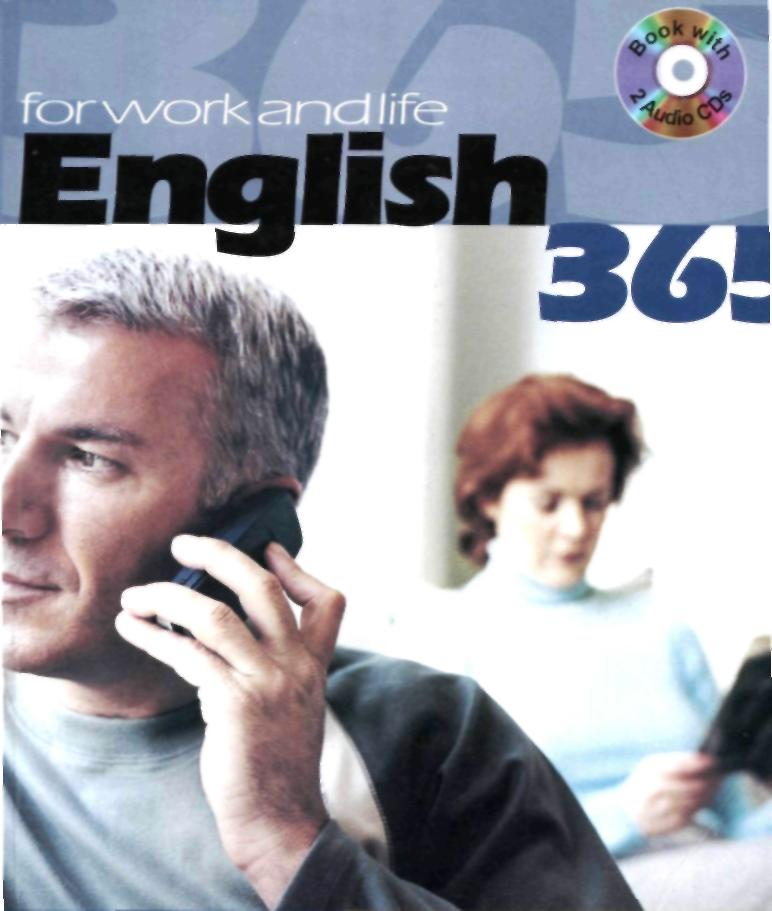
Bob Dignen Steve Flinders Simon Sweeney


Cambridge. New York, Melbourne, Madrid. Cape Town, Singapore. S3o PauJo. New Delhi
Cambridge University Press
c/o Cambridge University Press India Pvt Ltd.
Cambridge House
4381/4, Ansari Road. Daryaganj
New Delhi 110002
India
www.cambridge.org
r Cambridge University Press 2004
This publication is in copyright. Subject to statutory exception and to the provisions of relevant collective licensing agreements, no reproduction of any part may take place without the written permission of Cambridge University Press.
First published 2004
First South Asian edition 2007
This South Asian edition is based on Digncn / English 365. Student's book 1/ 9780521753623/2004
Printed in India at Sanat Printers Kundli. Haryana.
A catalogue record for this publication is available from the British Library
ISBN-13 978-0-521-71806-6 paperback (Book with 2 Audio CDs)
Cambridge Professional English
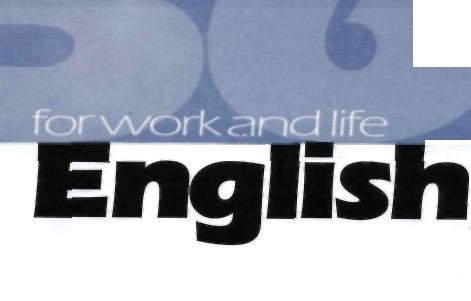
To the student 8
1 Nice to meet y
Listening
Say who you are
Grammar
The present simple 1
Pronunciation
Reply questions Speaking Meeting people
4 North and sout
Listening
A working day in the north ... and in
Ihe south of Europe
Grammar
The present simple 2
Pronunciation
The present simple third person
Speaking
Work routines
7 Changing workspace 1
Listening
This is where I work
Grammar
There is/are ...
Countable and uncountable nouns
Some and any; a lot of
Pronunciation
Linking
Speaking
Where you work
2 Helping people to 12 learn
Reading
A new future
Vocabulary
Job responsibilities
Speaking
Your job
Communicating at work
Telephoning 1; Getting information
5 Health care-public 21 or private?
Reading
Working at Vaxjo Hospital
Vocabulary
People and organisations
Speaking
Introducing your organisation
Communicating at work
Telephoning 2: Taking messages
8 The A team
Reading
We're a great team
Vocabulary
Describing people at work
Speaking
The people you work with
Communicating at work
Meeting a visitor at the airport
30
3 Have a good weekend 15
6 Downtown Barcelona 24
At the office
Listening
Enjoying your weekend
Vocabulary
Your free time
Speaking
Weekends
Social phrases
Shopping
Listening
A shoppers' paradise
Vocabulary
Location and shopping
Speaking
Where you live
9 I love Chicago
Social phrases
Getting around
Listening
It's my kind of town
Vocabulary
City life
Speaking
Where you live
33
4 Contents
10 Eating around the world |
36 |
13 Chanel |
45 |
Revision 1 Units 1-15 54 |
|
|
|
|
|
Listening |
|
Listening |
|
|
Favourite food |
|
Gabnelle (Coco) Chanel - inventor |
|
|
Grammar |
|
of the fashion industry |
|
|
Comparative and superlative |
|
Grammar |
|
|
adjectives |
|
The past simple |
|
|
Pronunciation |
|
Pronunciation |
|
|
Weak stress 1 |
|
Past simple verbs |
|
|
Speaking |
|
Speaking |
|
|
Comparing |
|
Your life and background |
|
|
11 Nice work |
39 |
14 Medecins Sans |
48 |
|
|
Frontieres |
|
|
|
Reading Homeworking |
|
Reading |
|
|
|
Medecins Sans Frontieres - |
|
|
|
Vocabulary |
|
working to help people |
|
|
Work |
|
Vocabulary |
|
|
Speaking |
|
Organisational structure |
|
|
What you want from your job |
|
Speaking |
|
|
Communicating at work |
|
Your organisation |
|
|
Emails 1: Giving your emails a clear |
Communicating at work |
|
|
|
"" |
|
Welcoming visitors to your organisation |
|
|
12 Do you salsa? |
42 |
15 Trekking in Nepal |
51 |
|
Social phrases |
|
Social phrases |
|
|
Responding to news |
|
Air travel |
|
|
Listening I hate watching TV |
|
Listening |
|
|
|
Walking at 5.000 metres |
|
|
|
Vocabulary Verbs and nouns tor sport and |
|
Vocabulary |
|
|
|
Holidays and travel |
|
|
|
physical activities |
|
Speaking |
|
|
Speaking |
|
Holidays |
|
|
Sport and physical exercise |
|
|
|
|
|
|
|
|
|
16 Project Stockholm |
56 |
19 Living in Hong Kong 65 |
22 Working for |
74 |
|
|
|
|
Rolls Royce |
|
|
Listening |
|
Listening |
|
Listening |
|
What protect are you working on at |
Chinese culture |
|
Work is like a second home |
|
|
the moment? |
|
Grammar |
|
Grammar |
|
Grammar |
|
Should and have to |
|
Many, much, a lew, a little |
|
The present continuous 1 |
|
Pronunciation |
|
Pronunciation |
|
Pronunciation |
|
Word stress |
|
Saying numbers and prices |
|
Sentence stress |
|
Speaking |
|
Speaking |
|
Speaking |
|
Organising a visit to another country |
Numbers and quantity |
|
|
Describing temporary situations |
* |
|
|
|
|
17 Workplace |
59 |
20 Online |
68 |
23 Start up |
77 |
communication |
|
|
|
|
|
Reading |
|
Reading |
|
Reading |
|
Communication ol the future |
|
Computer heaven or hell? |
|
Managing a small business |
|
Vocabulary |
|
Vocabulary |
|
Vocabulary |
|
Communication verbs |
|
Computers and the Internet |
|
Money and business finance |
|
Speaking |
|
Speaking |
|
Speaking |
|
Managerial qualities |
|
People and their computers |
|
Solving a business problem |
|
Communicating at work |
|
Communicating at work |
|
Communicating at work |
|
Emails 2: Replying to emails |
|
Telephoning 3: Arranging meetings |
Helping visitors |
|
|
18 Slow food |
62 |
21 Beirut Intercontinental |
71 |
241 buy money |
80 |
Social phrases |
|
Social phrases |
|
Social phrases |
|
At the restaurant |
|
Staying in a hotel |
|
Money talk |
|
Listening |
|
Listening |
|
Listening |
|
A great place to eat |
|
It's a great place to slay |
|
Hey. big spender |
|
Vocabulary |
|
Vocabulary |
|
Vocabulary |
|
Food and drink |
|
Hotels and hotel service |
|
Money and shopping |
|
Speaking |
|
Speaking |
|
Speaking |
|
Eating out |
|
Hotels |
|
Spending |
|
6 Contents
25 Driving to Romania Listening A job everyone wants to do Grammar |
83 |
28 Perfect planning 92 |
Revision 2 Units 16-30 101 |
|
Listening |
|
|
|
Have you organised everything? |
|
|
|
Grammar |
|
|
The present continuous 2 |
|
The present perfect |
|
Pronunciation |
|
Pronunciation |
|
Weak stress 2 |
|
Spelling and pronunciation |
|
Speaking |
|
Speaking |
|
Future plans |
|
Organising things at work / Making |
|
|
|
small talk |
|
26 Out of order |
85 |
29 A changing world 95 |
File cards 104 |
Reading |
|
Reading |
Grammar reference 110 |
Problems in Pennsylvania |
|
A year in Germany |
Tapescripts 121 |
Vocabulary |
|
Vocabulary |
Answer key 135 Tl 1 II 11 * J t J |
Words and expressions for problem |
Describing change |
||
solving |
|
Speaking |
Thanks and acknowledgements 144 |
Speaking |
|
Change |
|
Solving work problems Communicating at work Telephoning 4: Solving problem |
|
Communicating at work |
|
|
Emails 3; Arranging meetings by |
|
|
sby |
|
||
phone |
|
|
|
27 Teaching T'ai Chi |
89 |
30 Jets and pets 98 |
|
Social phrases |
|
Social phrases |
|
Inviting |
|
Saying goodbye |
|
Listening |
|
Listening |
|
T"ai Chi can improve your life |
|
Working with animals |
|
Vocabulary |
|
Vocabulary |
|
Health |
|
Learning for life |
|
Speaking |
|
Speaking |
|
Decision making |
|
Continuing your learning |
* |
Contents 7
Who is English365 for?
Welcome to English365. English365 is for people who need English for their jobs and for their free time. If you use English at work and also when you travel and meet people, English365 is for you. English365 is for and about real working people and every unit gives you English which you can use straightaway at work or in your free time.
What is English365?
There are two main parts to this course:
The Student's Book, which you are reading now. There are also classroom cassettes or audio CDs for the listening exercises in this book.
The Personal Study Book with Audio CD is to help you remember the English which you learn in the classroom. The more you work outside the classroom, the better your English.
The Personal Study Book has important information about the language, and exercises for you to practise.
The Audio CDs give you extra listening practice. You can also practise the Student's Book pronunciation exercises and the social English dialogues on your own.
What's in the Student's Book?
With the Student's Book, you can work on:
the grammar which you need to make English work for you
the vocabulary you need for your job and for your free time
the phrases you need for your free time - at the airport, in a hotel, etc.
the phrases you need for your work -telephoning, emailing, etc.
pronunciation rules to help you speak better and understand belter too.
There are 30 units in (he book (plus two revision units, one after Unit 15 and one after Unit 30). and there are three types of unit: Type 1 units (Units 1. 4, 7. etc. - the purple units) Type 2 units (Units 2. 5. 8. etc. - the blue units) Type 3 units (Units 3.6. 9. etc. - the green units)
In type 1 units you work mainly on:
Listening
Grammar
Pronunciation,
In type 2 units, you work mainly on:
Reading
Vocabulary for work
Communication skills for work - for telephoning, writing emails, meeting visitors. etc.
In type 3 units, you work mainly on:
Phrases for travel and socialising
Listening
Vocabulary for your free time.
Yoti practise speaking in every unit! At ihe back of the book, there are also:
File cards for pairwork exercises (page 104)
Grammar notes (page 110)
The tapescripts for the classroom cassettes/audio CDs (page 121)
Answers to all the exercises (page 135)
We hope you enjoy learning with English365. We had fun writing it. Good luck with your English.

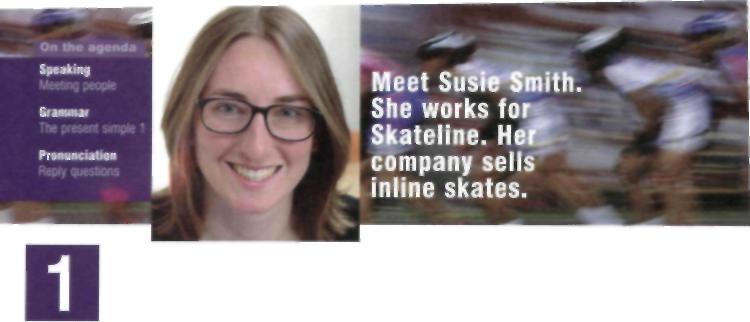 Nice
to meet you
Nice
to meet you
Read these two introductions:
f^Hi. I'm Susie.
B. Hi. I'm Masahiko Kamiya. Irom Ja3W
Which introduction is more formal?
What do you say when you welcome visitors at work?
Introduce yourself to the other people in your group.
a

D: Good morning. He" Wollmann from KV B3^^
Listen to this
Say who you are
1 Susie is on the Skateline stand at Expo - the
International Sportex Show. She makes notes about all the people she meets. I isten to her talking at the stand. Tick(/) the correct details about her visitor. ►Ml.l
Name:
Paula Visconti Olga Novotna Lena Monai
Visitor Irom:
Hungary
Russia
Italy
Company activity.
SpoiiswBar Skiing equipment
Bicycles
Action:
Send email
Arrange meeting
No act on
2 Listen again. Are these sentences about Susie's visitoi true or false? WM
It is her first visit to Expo T ■ F ■
Her home is 100 kilometres
from Moscow. T I F I
Technosport is in Moscow. T F I
She doesn't want a brochure, T I F I
Unit one 9
Grammar
reference page 111 ^
We can use the present simple to ask and answer questions when we meet people. Complete the questions and answers below.
Negative
I
don't live in Barcelona.
live
in Rome.
Look at the verb to be.
I'm from Spain.
I'm a personal assistant.
I'm not from Italy.
I (4) not
responsible
for sales.
No.
I'm not
What (3) your job?
Are you from Rome?
Yes. I (5)
Now look at two different ways you can use the verb to have.
No, I don't.
No,
I haven't.
(8) you got a brochure? Yes, I have.
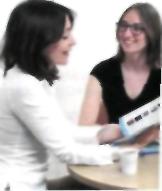
1 Correct the mistakes in these sentences. uOU
Do4w workmg for IBM? Do yew work for IBM?
Has you children?
1 doesn't work in Paris.
We working near Milan.
2 Match the beginnings and endings.
I work for ...
I come from ...
I live in ...
I'm...
I go to the US
... the north of England originally. ... a personal assistant. ... about six limes a year on
business. ... a British company. ... Croydon, about 20 kilometres
from London.
3 Match each question below (a-e) with one of the sentences above (1-5).
a Do you travel much in your job?
b What do you do?
c Who do you work for?
d Where do you live?
e Where are you from?
Now ask your partner the same questions.

10 Unit one
Complete tht* conversation between Susie and Maria. another visitor at the International Sportex show.
susie: So, where
you
<1>
from, Maria?
from
Italy.
SUSIE: Really'Are you
from
work
sell
Do
don't
I'm
make
do come
are
(3> Rome?
maria: No, I'm not. I'm from Milan.
(4> you know Milan?
SUSIE: Yes, I went there on holiday last year. It's a lovely place.
maria: Yes. it's beautiful. Do you
(5) to Italy often?
susie: No. I (6) travel much.
maybe two or three times a year for business.
maria: Which company do you (7) for?
susie: I work for Skateline.
maria: Skateline? Yes. I know the name.
What (8) you do exactly?
susie: We (9) inline skates. And you? What
do you do?
maria: We (10) bicycles.
Now listen and check. ►M1.2
C/>
Reply questions
When someone asks you a question in conversation, you can ask the same question back to show interest in the other person. When you do this, it's important to stress the you in your question.
1 Listen to Susie pronounce the you in this conversation. Then practise the conversation with a partner. WLS
maria: What do you do exactly?
susie: We make inline skates. And you? What do you do?
maria: We sell bicycles.
2 Make similar conversations with these questions. Practise with your partner.
Where do you live?
What do you do?
Do you travel much in your job?
Do you play tennis?
Which company do you work for?
It's time to talk
Get to know the other people in the room, asking and answering questions about their job. organisation, family and home.
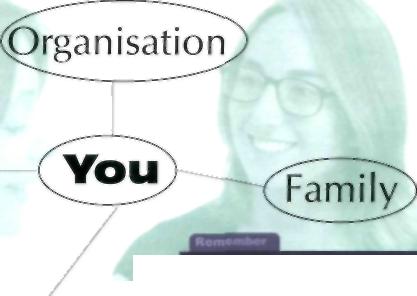 (g)
(g)
uHome^)
When you meet someone tor the first time.
Begin with Nice '<• meet you or JMIn.
Ask questions about their job. organisation, home, city. etc.
Use words like Realty or Interesting as you listen.
Stress the you when you ask a reply question.
End the conversation with Wet to mrel you or Good in meet \'<>ii.
Unit one II
On the agenda
Speaking |J
YOU!
Vocabulary Job
Tusponsibri I Communicating at work
Telephoning
1 Getting njormauon

Meet Bonnie Bernstrom. She works for Sprangbradan, a consulting company with a difference.
Helping people to learn
££
Read whai some people say about iheir work. Do you think the same7
I like working lor a small company. It's more friendly. I love writing and receiving emails. I like communicating^ I want to travel in my job. Work with no travel is boring*
Read on
A new future
1 We interviewed Bonnie about her job. Match our questions to Bonnie's answers.
 Which
organisation do you work tor?
Which
organisation do you work tor?What do you do?
Tell me about a typical day at work.
What do you like about your job? What don't you like?
I think trie best thing about my job is meeting people because it's nice to make new friends. I also like the email communication with the women I work with in Eastern Europe. We write every week just to say hello. That's really nice. One thing I don't like is writing reports. I work a lot on projects so I write a lot ol project reports. which is very boring!
Every day is different. There is no typical day! Bui I travel a lot to places like Moldova or Ukraine where I usually meet people and talk about political problems lor women in these countries - that kind of thing. But this week is good -1 have no business trips!
Well. I'm part of a consulting company in Sweden called Sprangbradan, that's 'springboard' in English. We are active in eight countries and we work with money we gel Irom the European Union for our projects We are small at the moment, with tour employees, who are all women.
Well. I'm a consultant and I give training to women and men in the lormer Soviet Union countries about politics. I'm responsible tor helping women to begin in politics. both locally and nationally. We discuss problems a lot and think about how to make a new future. My target is to help 100% more women into politics in these countries.
How many people work tor Sprangbradan?
What does Bonnie like most about her job?
2 Read (he text again and answer these questions about Bonnie. 1 What is Bonnie's main responsibility?
2 Where does Bonnie travel for her job?
Whatdovou think"*
Would you like to do Bonnie's job? What do you like about your job? What don't you like?
